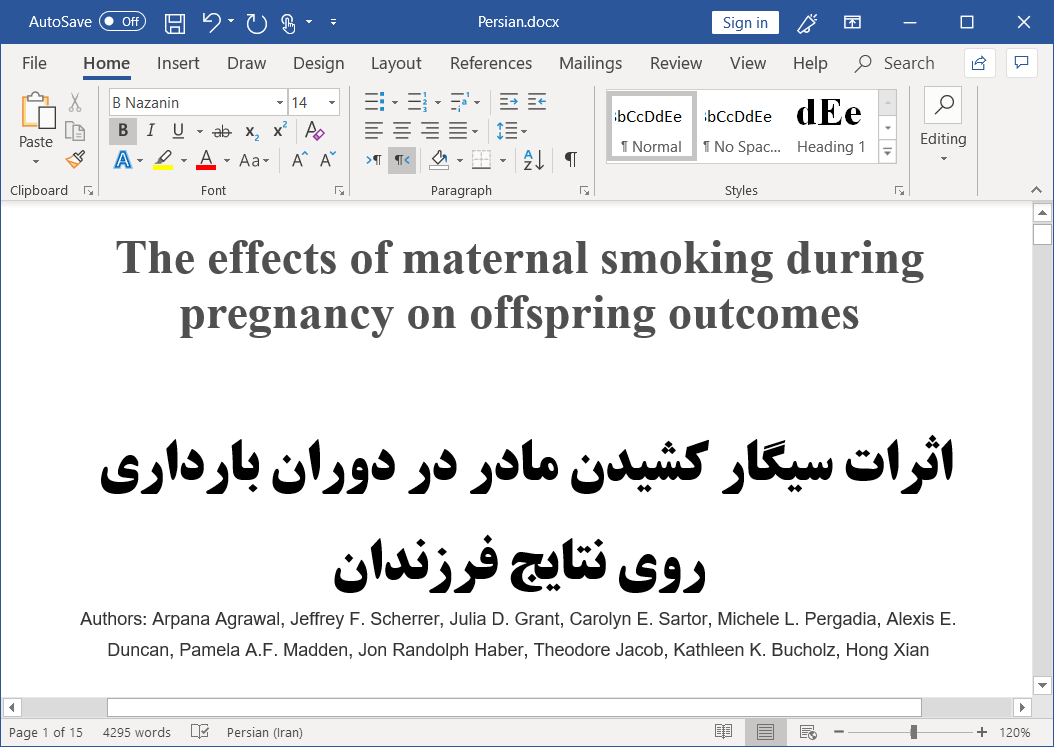تاثیرات سیگار کشیدن مادر در دوران بارداری (MSDP) بر نتایج فرزندان


13,200 تومانشناسه فایل: 12714
- حجم فایل ورد: 251.8KB حجم پیدیاف: 155.2KB
- فرمت: فایل Word قابل ویرایش و پرینت (DOCx)
- تعداد صفحات فارسی: 15 انگلیسی: 6
- دانشگاه:
- Washington University School of Medicine, Dept. of Psychiatry, 660 S. Euclid, CB 8134 , Saint Louis, MO 63110, USA
- St. Louis Veteran Affairs Medical Center, USA
- VA Palo Alto Health Care System, USA
- Pacific Graduate School of Psychology, USA
- ژورنال: Preventive Medicine (1)
مقدمه مقاله
در این مطالعه، با استفاده از داده های مربوط به 1342 حاملگی منحصر به فرد، و با فرزندان 12 الی 32 ساله، پدران و مادران آن ها، ما به بررسی ارتباط بین سیگار کشیدن مادر در دوران بارداری (MSDP) و نتایج فرزندان شامل: وزن زمان تولد پایین، تولد زودرس، درمان ناتوانی آموزشی، موفقیت تحصیلی پایین، اختلال کم توجهی – بیش فعالی (ADHD)، مشکلات اختلال رفتاری (CD) و سیگار کشیدن منظم در فرزندان پرداختیم. ما بر اهمیت کنترل تاثیرگذاری رفتارهای والدین در مطالعات مربوط به سیگار کشیدن مادر در دوران بارداری (MSDP) و نتایج فرزندان و، به عنوان یک تجزیه و تحلیل ثانویه، آزمودن پیوندهای بالقوه ژنتیکی و محیطی پرداختیم که ممکن است در رابطه بین سیگار کشیدن مادر در دوران بارداری (MSDP) و نتایج فرزندان نقش داشته باشد.
ABSTRACT The effects of maternal smoking during pregnancy on offspring outcomes
Objective To evaluate the possible association between maternal smoking during pregnancy and offspring outcomes of birth weight, preterm birth, remediation, low scholastic achievement, regular smoking, attention deficit hyperactivity disorder and conduct problems while controlling for similar behaviors in parents.
Methods
Using telephone interviews, data were collected, in 2001 and 2004, as a part of two United States offspring-of-twins projects. Fathers, who were twins participating in the Vietnam Era Twin Registry, their female spouse and their offspring were interviewed — information on 1,342 unique pregnancies in mothers with a history of regular smoking was utilized for these analyses. The association between maternal smoking during pregnancy and birth weight, pre-term birth, remediation, low scholastic achievement, regular smoking, attention deficit hyperactivity disorder and conduct disorder while controlling for similar behaviors in parents, was examined using regression.
Results
Maternal smoking during pregnancy was associated with decreased birth weight, low scholastic achievement, regular smoking and attention deficit hyperactivity disorder. However, the association between maternal smoking during pregnancy and offspring attention deficit hyperactivity disorder was explained by maternal attention deficit hyperactivity disorder. Maternal smoking during pregnancy was also associated with earlier age of offspring initiation of smoking and onset of regular smoking.
Conclusions
Maternal smoking during pregnancy may influence certain offspring outcomes via mechanisms that are independent from genetic risk attributable to comorbid conditions. Assisting expecting mothers with their smoking cessation efforts will likely provide widespread health benefits to both mother and offspring.
Introduction
In 2006, 17% of women giving birth reported cigarette smoking during pregnancy during their last trimester (Centers for Disease Control (CDC), 2004; PRAMS, 2007). While persistent cigarette smoking itself is one of the leading contributors to preventable death (Centers for Disease Control (CDC), 2002), maternal smoking during pregnancy (MSDP) has in and of itself been implicated as a potential risk factor associated with multiple offspring outcomes such as low birth weight, conduct disorder (CD), attention deficit hyperactivity disorder (ADHD), offspring smoking and cognitive dysfunction (Knopik, 2009).
Low birth weight and other birth outcomes
There is considerable evidence supporting the hypothesis that offspring of mothers who smoke during their pregnancies have impaired fetal growth, preterm birth and lower birth weight infants (Conter et al., 1995; D’Onofrio et al., 2003; Knopik et al., 2005; Bada et al., 2005; Salihu et al., 2005; Kyrklund-Blomberg et al., 2005; Stroud et al., 2009; McCowan et al., 2009; Thiriez et al., 2009), which, in turn, are correlated with a host of neuropsychological developmental delays. Of these, the association between MSDP and low birth weight appears to account for many of the associated outcomes, replicating consistently in prospective and retrospective studies.
Cognitive dysfunction and impaired learning
Some studies report impaired learning in those prenatally exposed to cigarette smoke, although results are equivocal (Bauman et al., 1991; Eskenazi and Trupin, 1995; Cornelius et al., 2001; Batstra et al., 2003; Mortensen et al., 2005; Lambe et al., 2006). Using an array of laboratory tasks, Cornelius et al. (2001) found support for an association between MSDP and deficits in multiple aspects of learning and memory. In another study, MSDP was associated, via familial factors, with poor school performance (Lambe et al., 2006).
Externalizing behaviors
While the mechanism underlying their association is still under investigation, several studies report higher rates of externalizing behaviors, including attention deficit hyperactivity disorder (ADHD), conduct disorder (CD) as well as higher impulsivity and other problem behaviors in the offspring of mothers who smoked during their pregnancy (Milberger et al., 1996; Fergusson et al., 1998; Wakschlag et al., 2002, 2006; Batstra et al., 2003; Maughan et al., 2004; Knopik et al., 2005, 2009; Cornelius et al., 2007; D’Onofrio et al., 2008). Two recent studies have investigated the familial links between MSDP and externalizing disorders (Knopik et al., 2006; D’Onofrio et al., 2008) — broadly, these studies suggest that familial factors partially contribute to the association between MSDP and externalizing behavior, although the mechanisms are unclear. Multiple studies also report the association between MSDP and externalizing behaviors to be explained by maternal problem behaviors (Orlebeke et al., 1999; Silberg et al., 2003; Maughan et al., 2004).
Offspring smoking
There is growing evidence that prenatal exposure to cigarette smoking increases the likelihood of cigarette smoking in the offspring (Cornelius et al., 2000, 2005). Given the high correlation between maternal nicotine dependence and MSDP (Agrawal et al., 2008; O’Callaghan et al., 2009), these youths represent a particularly vulnerable group of individuals with both increased genetic (inherited often from both parents who are smokers) and environmental risk (attributable to MSDP and potentially, via exposure to parents who smoke) risk.
In this study, using data on 1,342 unique pregnancies, with offspring aged 12–32, their fathers and mothers, we investigate the association between MSDP and offspring outcomes of low birthweight, pre-term birth, remediation, low scholastic achievement, ADHD, CD problems and regular smoking in the offspring. We highlight the importance of controlling for the influence of parental behaviors in studies of MSDP and offspring outcomes and, as a secondary analysis, also test for potential genetic and environmental links that may contribute to the relationship between MSDP and offspring outcomes.
- مقاله درمورد تاثیرات سیگار کشیدن مادر در دوران بارداری (MSDP) بر نتایج فرزندان
- پروژه دانشجویی تاثیرات سیگار کشیدن مادر در دوران بارداری (MSDP) بر نتایج فرزندان
- اثرات سیگار کشیدن مادر در دوران بارداری بر روی نتایج فرزندان
- پایان نامه در مورد تاثیرات سیگار کشیدن مادر در دوران بارداری (MSDP) بر نتایج فرزندان
- تحقیق درباره تاثیرات سیگار کشیدن مادر در دوران بارداری (MSDP) بر نتایج فرزندان
- مقاله دانشجویی تاثیرات سیگار کشیدن مادر در دوران بارداری (MSDP) بر نتایج فرزندان
- تاثیرات سیگار کشیدن مادر در دوران بارداری (MSDP) بر نتایج فرزندان در قالب پاياننامه
- پروپوزال در مورد تاثیرات سیگار کشیدن مادر در دوران بارداری (MSDP) بر نتایج فرزندان
- گزارش سمینار در مورد تاثیرات سیگار کشیدن مادر در دوران بارداری (MSDP) بر نتایج فرزندان
- گزارش کارورزی درباره تاثیرات سیگار کشیدن مادر در دوران بارداری (MSDP) بر نتایج فرزندان
